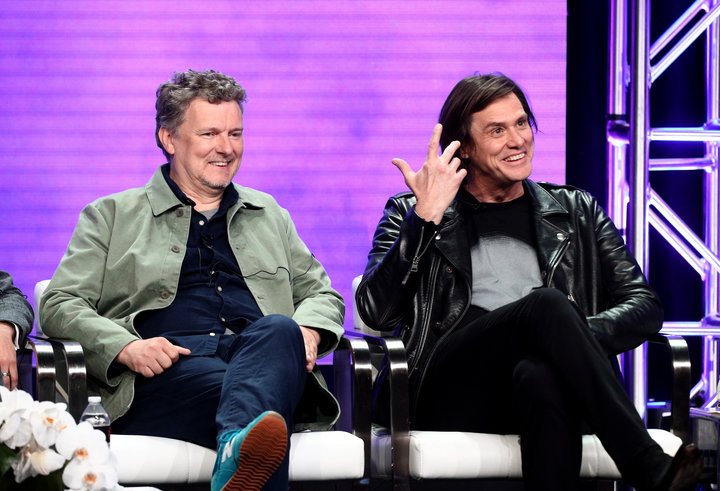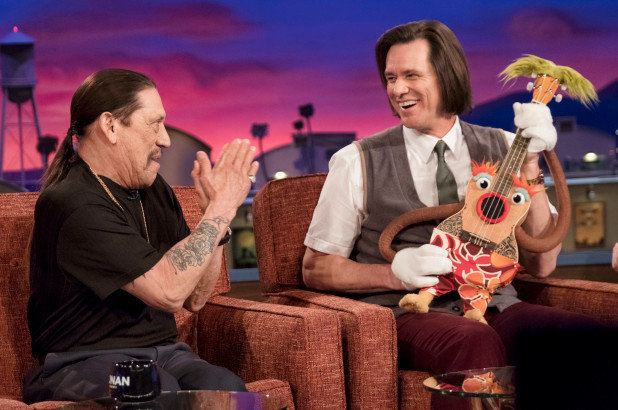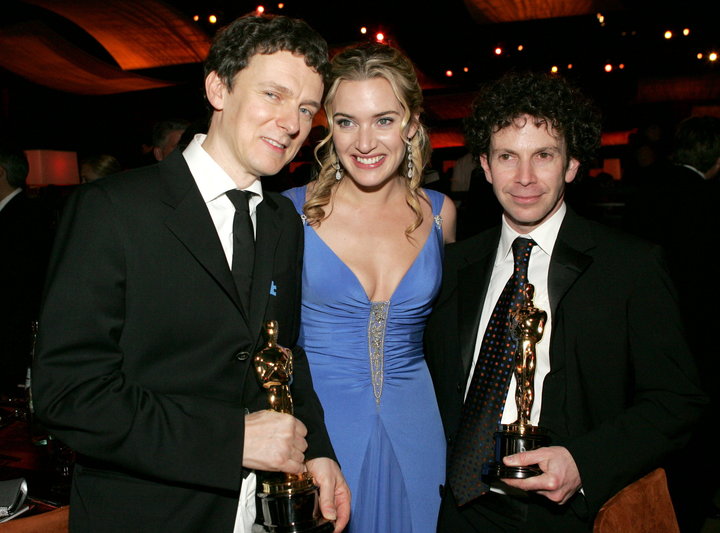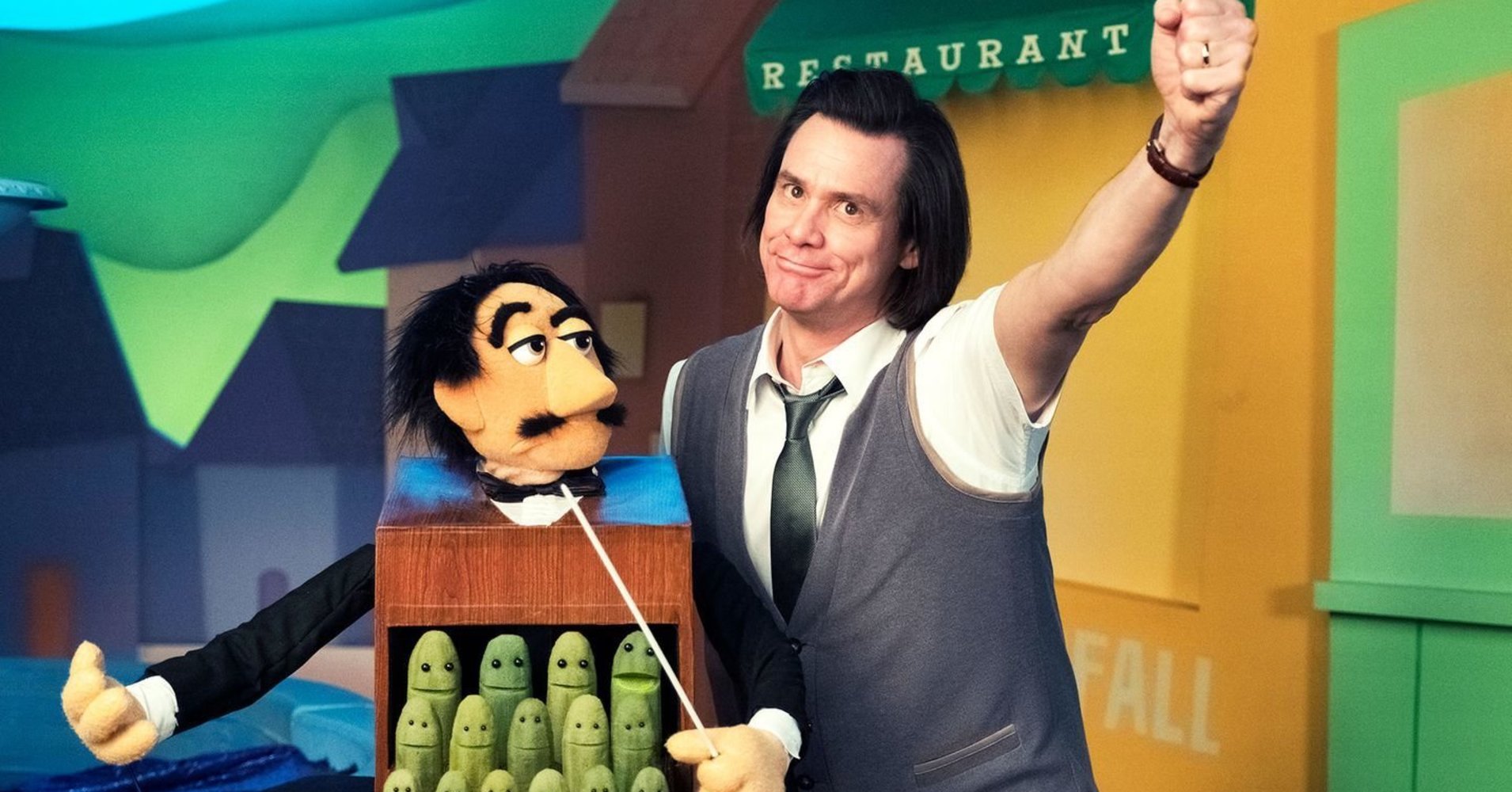[ad_1]
With “Eternal Sunshine of the Spotless Mind,” director Michel Gondry coaxed a tender, career-defining performance out of Jim Carrey, the rubbery funnyman who was still best known for broad blockbuster antics when that romantic gem opened in 2004.
With “Kidding,” Carrey and Gondry bring to life another soul-searching introvert desperate for fulfillment ― but this time he bears a striking resemblance to a beloved cultural figure who re-entered the zeitgeist this summer: Mister Rogers.
Carrey plays Mr. Pickles, a Rogers-esque television host beamed into children’s homes daily to preach the gospel of kindness, self-love, peace and prosperity. But Mr. Pickles, otherwise known as Jeff, is undergoing something of a grief-stricken identity crisis. Newly divorced from his longtime wife (Judy Greer) and keenly aware of life’s fallibility, Jeff wants to introduce honest messages about death and adversity to his show’s youthful viewers. His father (Frank Langella), who runs the buttoned-up puppet program with Jeff’s sister (Catherine Keener), won’t hear of it, sending Jeff into a tailspin.
In typical Gondry style, “Kidding” has a whimsical ease that’s hardened by an underlying melancholy. This is one of the rare times Gondry didn’t write his own script ― the show was created by “Weeds” writer Dave Holstein ― but it very much falls in line with the idiosyncrasies the French director has brought to “Eternal Sunshine,” “The Science of Sleep.” “Be Kind Rewind,” “The Green Hornet” and numerous music videos for acts like The White Stripes and Kanye West.
Ahead of Sunday’s premiere, I hopped on the phone with Gondry to talk about “Kidding.” This interview has been lightly edited for clarity.
The show premieres right as Mister Rogers is very much in the American zeitgeist again because of the beloved documentary that came out a couple of months ago. How much did you and the other folks involved draw on Fred Rogers for inspiration of any kind?
Well, we could not ignore him. We watched the documentary before it came out, all the crew. But I really recommended that Jim and the other actors don’t watch it, and don’t think of Mister Rogers because it’s Mister Pickles now.
To me, Jim Carrey has a more interesting and complicated life, from which you can dig and find any amount of the character and the story. I don’t like biopics and the work of the actor when they mimic the original. It seems they wear a mask. To me it makes me more concerned that they are not the real person. It takes me out of the story or the film.

Frederick M. Brown via Getty Images
The only great biopics are ones that take a more impressionistic or abstract approach. In terms of what Mr. Pickles represents to America, are you drawing at all on the idea of what Mister Rogers represents to America?
It’s difficult for me to answer this question because I didn’t grow up with Mister Rogers or even “Sesame Street.” We had different entertainment in France. From what I remember, I found them too traditional. So on my side, I started from scratch, so what I can say is he is a figure that makes people listen to him. He represents something important for America.
Now I don’t know Mister Rogers enough to compare. I guess he was important as well, and there will be the comparison. But it really was important for me to separate the two.
What was the first image or aesthetic that came to mind when you first started imagining this series coming to life?
It was two images of Mr. Pickles. One on the show: very positive and wise. And one out of the show: much more tortured, trying to remain the same way he is initially, but falling apart. So that was my first image, to see this two aspects of Mr. Pickles.
Also, all the world of the show, with the set and the puppets, was something that intrigued and interested me from the beginning.
Your work often involves some sort of ill-fated romance or disillusion of a relationship, and here Mr. Pickles is newly divorced. What went into building Mr. Pickles’ romantic life?
Well, for sure he’s not like your everyday lover or person, because he tries to be 100 percent. He’s a character, what he represents to America. So his romantic life becomes very complicated and tortured, and I think with the first women he seduces [after his divorce], it’s because he sort of exploded with rage in a completely unpredictable way. She sees this very much more masculine aspect, and she falls in love with him. So he has a sentimental life, but I think it’s part of the humor of the series. It’s not your love story for every day.
There’s another version of this story where Mr. Pickles is corrupt or deranged. Part of the surprise of Mr. Pickles and Mister Rogers is that they are who they say they are, more or less. But Mr. Pickles is fed up. How much did you want to push the boundaries in shattering the idea of this eternally cheerfully and almost falsely optimistic kind of figurehead in culture?
I think, especially in the beginning, there is nothing false about his message or his demeanor. He’s really 100 percent what you see, and he tries to remain the same in the outside world. But that’s where it’s tough. His cracks start to cross his character because he can’t see he’s a prisoner to the real world when his world starts to collapse. I mean, if his world was perfect or if everything was fine, he could be the same. But he’s not prepared for an accident or disaster or sudden bad luck, and that’s what interesting me: to see how somebody who is supposed to have a demeanor and a message that’s very positive confront the real world that’s being very negative to him.

Showtime
Let’s talk about your career. After making “The Green Hornet,” you went in a very different direction with small, independent, French character-study movies. When “Kidding” entered your life, were you at all hesitant to go back into the world of big corporate productions that would inevitably come with loftier box office expectations ― or, in this case, ratings expectations?
I like both ways of working. Of course, the bigger the budget is, the more projections you have and less control you get in the creativity. But sometimes it’s nice to go in a studio and have the biggest stage, like Sony for “Green Hornet,” and destroy everything. There are advantages or amusing things, but then the world of studio I don’t think is made for me.
I have stories that I write during the evening when I shoot a big movie, and it becomes a smaller movie but much more personal, like “The We and the I,” which I did just after “The Green Hornet.” The result is more satisfying for me, and then I go back and I do a bigger movie and then I do a TV show because there is a real originality and a universe created by Dave Holstein. You can tell there is depth and originality, so it’s exciting.
And yet we work in a system that has been established years and years ago and sometimes doesn’t make sense, but you can’t change it. And you imagine some way to do something personal and original.
Had you considered doing television before “Kidding”?
No. I did one episode of “Flight of the Conchords” because I was friends with them. I love the show. But “Kidding” is my first experience for television.
Do you find it easier or harder to tackle something that isn’t based on your own writing?
Well, it’s more collaborative. I have questions, of course, but I have the writer right here. When it’s my own writing, I find the solution and the reason of things in my memories or subconscious.
Given that you did not direct every episode, what was your strategy in creating a unifying visual language? The episodes you didn’t direct still look and feel like Michel Gondry pieces.
OK, so we have the exact same crew, the same [director of photography], who is going to indicate the shots I used to do. Jake Schreier, who did [Episodes] 3 and 4, spent a week coming to set every day to see how we used to work. I give him my feelings on the actors. All that, plus the scripts. The same writer made the episodes blend together.
There’s no question that “Eternal Sunshine” is your most famous project, and it was well-received when it opened. But are you aware of just how beloved the movie has become in the years since?
Yes, of course. Most people who come to me tell me that “Eternal Sunshine” is one of their favorite movies. Sometimes I feel it’s a bit like a burden, but also they are in a younger generation. A lot of kids who love “Be Kind Rewind” for the spirit of making the film, the humor and the mood, and they have no idea and they don’t care that I did “Eternal Sunshine.” Of course they are less numbered, but I mean it’s a lot of 12- and 15-year-olds.
And then you have people who have seen “Dave Chappelle’s Block Party,” and they have no idea I am the same director who did “Eternal Sunshine.” So each film has its own existence. Noam Chomsky, for instance, only knows the film I did about him, but he’s an important viewer. But I mean, of course I would to do another movie that people prefer to “Eternal Sunshine,” but I don’t want to think too much about that.

Lucy Nicholson / Reuters
It becomes sort of a slippery slope when you start trying to outdo yourself. Had you and Jim Carrey tried to work together again between “Eternal Sunshine” and “Kidding”?
Yes, we were looking for a good project to work together.
Did you come close at any point before this?
Maybe once or twice, but really when we read “Kidding,” we felt it was the right story. We were really happy to work again together. It was really easy because he trusted me 100 percent and I could try many different directions, and he had no ego. I could speak directly to him or tell him stuff that many actor would take offense over.
Have you seen Jim’s documentary about playing Andy Kaufman that came out last year?
What did you make of that movie’s portrayal of him as an intense method actor?
Personally, I don’t believe in method actors. I thought he was amazing in his movie, but I am pretty sure he would have been as good without having to stay in character all the time.
So you’ve never had an actor who wanted to do that on one of your sets?
No, I’m lucky because I think its ridiculous.
[ad_2]
Source link

